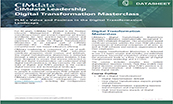Leveraging Packaged Solutions for SAP to Accelerate R&D Transformation
Key Takeaways
- Companies in process manufacturing industries have many unique challenges to overcome to get formulated products to market and sustain them successfully.
- Product Lifecycle Management (PLM) solutions are a critical enabler for the development of formulated products, and the adoption of PLM can help businesses be more efficient.
- SAP has helped many customers develop products more efficiently and with better quality by implementing SAP PLM, a key element of their integrated business suite.
- Successfully implementing SAP PLM to meet specific customer requirements requires deep technical knowledge coupled with a strong understanding of business best practices.
- Linx-AS has decades of experience of implementing SAP PLM, which has been captured in a suite of packaged business solutions which embody best practices and can be implemented quickly.
Introduction
Many of the products we consume on a daily basis are manufactured by combining ingredients in specific amounts in a near-continuous process. Products such as food, beverages, personal care, flavors, fragrances, and specialty chemicals are all manufactured in this way. Most of these processes include steps for mixing, stirring, heating, cooling, and drying—all of which must be carefully controlled.[1]
Companies in process-oriented industries have many unique challenges to overcome to get their products to market and sustain them successfully—e.g., managing complex recipes, performing nutrition/formula analysis, complying with regulations (e.g., for food handling, dangerous chemicals), developing packaging, ensuring labeling accuracy, proactively managing quality, and ensuring safety.
Many of these companies are attracted to SAP to meet their specific needs for solutions for managing product formulation, manufacturing, quality, finances, operations, and compliance based on their decades of experience. Typically these companies will work with a certified SAP partner to help them implement specific SAP solutions, build an integrated environment, or manage a digital transformation program.
Finding a suitable partner familiar with the sophistication of SAP’s solutions and the nuances of process manufacturing is critical for success, as is the ability to bring industry best practices to the PLM implementation.
Transforming R&D Processes to Support the Product Lifecycle
In the past, many process manufacturing companies have attempted to manage the complexity of their R&D processes by implementing multiple “best in class” point solutions to assist with tasks such as raw material, ingredient and recipe management, process planning, and quality management. In many cases these “solutions” will include complex spreadsheets to fill data and process gaps.
But in an environment where systems are fragmented, users work in information silos creating data quality issues, disjointed communication among team members and across business functions (especially into downstream functions including sourcing, manufacturing, and supply chain), and lack of management visibility into product development status. As a result development timescales can be overly long, costly errors can occur, operations may be inefficient, product scrap due to poor data quality may occur, and it may be impossible to trace ingredients, all raising business risk.
PLM is a Critical Enabler
PLM is a critical enabler for the development of formulated products, bringing together many previously isolated roles and tasks in R&D, improving collaboration, data integrity, and avoiding costly errors.
However, replacing multiple R&D solutions with one is only going part of the way. To maximize business efficiency, PLM must be tightly integrated with other business processes, both upstream and downstream of R&D.
SAP PLM can help R&D users collaborate more effectively by establishing a “single source of the truth” for product information. But SAP can help companies go a step further, by linking R&D with other parts of the company, all operating on SAP’s integrated business platform.
This can lead to many benefits:
- Accelerating time to market by eliminating delays between task and process steps and time wasted looking for information or project status.
- Increasing quality and reducing risk by reducing or eliminating errors and improving information visibility.
- Increasing operational efficiency by improving data integrity, communication, and collaboration.
- Increasing visibility of formula ingredients and traceability through manufacturing and the supply chain.
These improvements can, in time, lead to more breakthrough innovations, as teams learn to work together more effectively and information flows more efficiently, and management visibility is improved.
Accelerating Implementation and Capturing Best Practices
Implementing PLM can be a time-consuming and expensive process and manufacturers are looking for help. Ideally, they want a consulting partner who can bring domain experience of their industry, deep knowledge of SAP PLM and SAP’s business platform, and experience with embodying industry best practices in their work. Linx-AS is such a partner, with a long-established consulting business focused on helping SAP customers who develop formulated products by implementing PLM and other product compliance solutions.
To further help process manufacturers, Linx-AS has created a number of solution bundles, branded as ROI NowTM, incorporating best practice business processes, SAP solution enhancements, project delivery accelerators, and dedicated support. Linx-AS claim that adoption of ROI Now bundles can shrink the implementation timeline up to 55% and reduce project delivery costs by as much as 30% depending on the specific solution bundle.
Linx-AS offers a number of bundles as follows:
- ROI Now for R&D Transformation.
- ROI Now for Enterprise Engineering.
- ROI Now for Portfolio & Project Management.
ROI Now for R&D Transformation
ROI Now for R&D Transformation bundles best practice business processes which have been tested and refined over years of project success. These processes include:
- Developing specifications, formulas, and recipes.
- Prototyping and simulating finished products and manufacturing process.
- Analyzing formulas—nutritional content (in the case of food or beverage products) or compliance analysis for personal care and specialty chemicals.
- Ensuring regulatory compliance for respective industry segments.
- Designing packaging and packaging compliance.
- Finalizing product labeling.
- Defining the bill of materials for the finished product goods.
- Release to manufacturing.
The scope and benefits of Linx-AS’ ROI Now for R&D Transformation are shown in Figure 1. Note the capabilities in the boxes on the top left and right where collaboration can occur, internally or with suppliers. This collaboration is enabled by a newly introduced SAP PLM cloud-based product called Enterprise Product Development (EPD).

Figure 1— Best Practice Process Scope of ROI Now for R&D Transformation
(Courtesy of Linx-AS)
A key element of the ROI Now bundle is the SAP PLM solution enhancements which are unique to Linx-AS. According to Linx-AS, these solution enhancements can knock weeks, or even months, off implementation time while enhancing user satisfaction. The solution enhancements implemented in ROI Now for R&D Transformation include:
- A robust Workflow Solution implemented using the native SAP workflow platform.
- Simplified Product Labeling functionality with enhanced calculations and international templates.
- An Integrated Collaboration Platform enhanced for process PLM requirements.
- Windows Wordprocessor Integration (WWI) reporting enhancements (including multiple templates and symbols for recipes and labels) which generate dynamic reports in MS Word with data from the SAP specification database.
ROI Now for R&D Transformation includes Project Delivery Accelerators to speed implementation time and reduce risk. Significant amongst these Accelerators is Linx-AS’ proprietary data design and load tools which save a significant amount of time in data cleansing and migration. ROI Now for R&D Transformation also includes dedicated support for the scope of the ROI Now implementation.
Linx-AS History and Growth
Linx-AS is a long-established consulting business focused on helping SAP customers improve the development of formula-based products via implementation of PLM solutions. The company is specifically focused on supporting companies in the Consumer Products industry (e.g., Food & Beverage, Personal Care), Life Sciences, and Specialty Chemicals.
Linx-AS was founded 20 years ago by a group of executives from Deloitte’s EH&S (Environmental Health and Safety) practice and has progressively developed its offerings:
- Initial focus on implementation services for SAP’s EH&S solutions.
- Added implementation services for SAP’s process manufacturing PLM solutions (Specification Database and DMS).
- Formalized a development group for applications and integration tools.
- Diversified service portfolio with SAP User Experience practice.
To guide implementations, Linx-AS has developed the Vision Methodology—an accelerated planning process for developing a strategic roadmap for PLM. In CIMdata’s view, methodologies such as this can significantly increase overall project success and benefits.
Linx-AS has also created several solution bundles branded as ROI NowTM and incorporating best practice business processes, SAP solution enhancements, project delivery accelerators, and dedicated support.
Linx-AS has also developed expertise in upgrading legacy SAP PLM environments to the latest version of S/4HANA, giving them an edge over system integrators who lack this specific knowledge.
Linx-AS customers include: CPG leaders Edgewell (personal care), Tree House Foods (private label food and beverages), and Blue Diamond (the almond company); biotechnology innovator Stemcell Technologies; and beauty products leader Coty.
Conclusion
Companies in process manufacturing industries have many unique challenges to overcome to get formulated products to market and sustain them successfully. Rather than the product, the process complexity often makes the difference for these companies. PLM is a critical enabler for the development of formulated products, and the adoption of an integrated suite such as SAP PLM can help businesses be more innovative and efficient.
Configuring SAP PLM to meet the requirements of a specific customer can be time-consuming, expensive, and may not capture best practices. Linx-AS has decades of experience of implementing SAP PLM with many leading process manufacturers. This experience has led to the development of a suite of packaged business solutions which embody best practices and can be implemented quickly, helping SAP PLM customers develop formula-based products more efficiently and with better quality.
Overall, CIMdata is very impressed by Linx-AS’s focus on SAP, the breadth and completeness of its software and service offerings, and its many impressive reference customers. In CIMdata’s view, delivering pre-configured solution extensions can reduce the time and risk to develop products and improve overall end-customer satisfaction. CIMdata recommends process manufacturing businesses planning to implement or extend SAP’s PLM solutions to consider Linx-AS.




